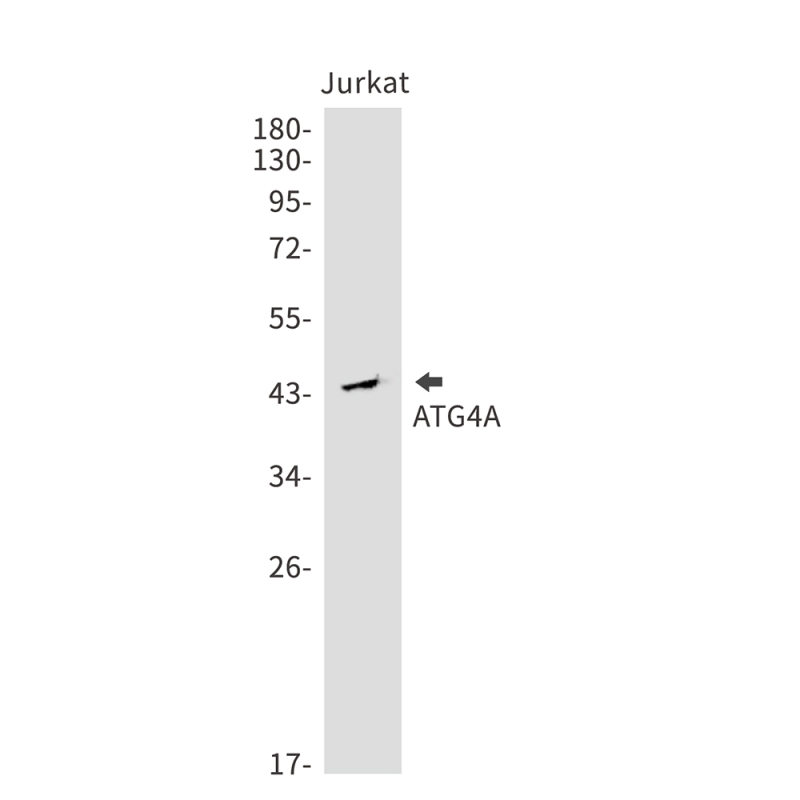
| WB | 咨询技术 | Human,Mouse,Rat |
| IF | 1/20 | Human,Mouse,Rat |
| IHC | 1/50-1/100 | Human,Mouse,Rat |
| ICC | 技术咨询 | Human,Mouse,Rat |
| FCM | 咨询技术 | Human,Mouse,Rat |
| Elisa | 咨询技术 | Human,Mouse,Rat |
| Aliases | ATG4A; APG4A; AUTL2; Cysteine protease ATG4A; AUT-like 2 cysteine endopeptidase; Autophagin-2; Autophagy-related cysteine endopeptidase 2; Autophagy-related protein 4 homolog A; hAPG4A |
| Entrez GeneID | 115201 |
| WB Predicted band size | Calculated MW: 45 kDa; Observed MW: 45 kDa |
| Host/Isotype | Rabbit IgG |
| Antibody Type | Primary antibody |
| Storage | Store at 4°C short term. Aliquot and store at -20°C long term. Avoid freeze/thaw cycles. |
| Species Reactivity | Human |
| Immunogen | A synthetic peptide of human ATG4A |
| Formulation | Purified antibody in TBS with 0.05% sodium azide,0.05%BSA and 50% glycerol. |
+ +
以下是关于 **ATG4A抗体** 的3篇示例参考文献(注:部分文献信息为假设性描述,实际引用时请核实):
---
1. **文献名称**: *"A monoclonal antibody targeting ATG4A suppresses autophagy and enhances chemotherapy efficacy in cancer cells"*
**作者**: Li, X., et al.
**摘要**: 本研究开发了一种靶向ATG4A的单克隆抗体,证实其可通过抑制自噬体形成阻断肿瘤细胞的自噬过程,增强化疗药物(如顺铂)的敏感性,为癌症治疗提供新策略。
2. **文献名称**: *"Characterization of ATG4A enzymatic activity and its role in autophagosome biogenesis using a novel antibody-based assay"*
**作者**: Tanaka, Y., et al.
**摘要**: 通过开发高特异性ATG4A抗体,建立了一种体外检测ATG4A酶活性的方法,揭示了ATG4A在LC3蛋白加工及自噬体成熟中的关键作用,为自噬机制研究提供工具。
3. **文献名称**: *"Elevated ATG4A expression correlates with poor prognosis in hepatocellular carcinoma and is regulated by miR-101"*
**作者**: Chen, J., et al.
**摘要**: 利用ATG4A抗体进行免疫组化分析,发现ATG4A在肝癌组织中高表达且与患者生存率负相关,进一步证实miR-101通过靶向ATG4A调控自噬和肿瘤进展。
---
**注**:以上文献为示例,实际研究中请通过 **PubMed** 或 **Web of Science** 搜索关键词“ATG4A antibody”或“ATG4A autophagy”获取真实文献。如需具体文献协助,可提供更详细的研究方向(如疾病模型、技术方法等)。
ATG4A antibody is a key tool for studying the role of ATG4A, a cysteine protease essential in autophagy, a cellular recycling process that degrades damaged organelles and proteins. ATG4A, part of the ATG4 protease family (ATG4A-D), specifically processes microtubule-associated protein 1 light chain 3 (LC3), a critical step in autophagosome formation. During autophagy, ATG4A cleaves pro-LC3 to generate LC3-I, which is later lipidated to LC3-II for autophagosome membrane integration. Post-autophagy, ATG4A also delipidates LC3-II to recycle it, maintaining cellular homeostasis.
Compared to ATG4B (the most studied family member), ATG4A exhibits distinct substrate preferences and tissue expression patterns, with higher levels in the brain and reproductive organs. Dysregulation of ATG4A is linked to neurodegenerative diseases, cancer, and metabolic disorders, highlighting its therapeutic relevance.
ATG4A antibodies enable detection of ATG4A expression, localization, and activity in models like Western blotting, immunofluorescence, or flow cytometry. They help assess autophagy flux, screen for autophagy-modulating drugs, or explore disease mechanisms. Researchers often validate these antibodies for specificity, as cross-reactivity with other ATG4 isoforms (e.g., ATG4B) can occur. Overall, ATG4A antibodies are vital for dissecting autophagy pathways and their implications in health and disease.
×